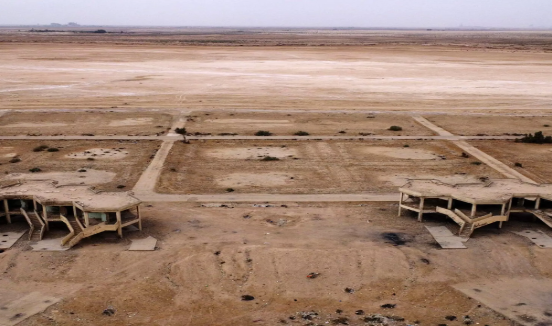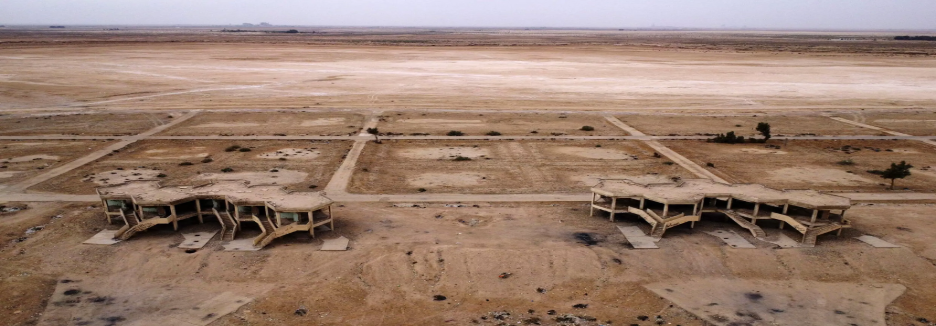Climate, Health and Equity Brief
Losses on land, extinctions at sea, and three possible climate scenarios
May 5, 2022

The Climate, Health & Equity Brief is GMMB’s take on the week’s news on the current impacts of climate change. If you haven’t subscribed yet, you can do so by clicking here.
Hot Topic: Climate losses. While climate change is often associated with harmful increases in things like heat and rainfall, new developments this week point to the growing threat of climate-fueled losses across every corner of the planet.
First, a new report out of Princeton University warns that many ocean species that have managed to survive overfishing and plastic and industrial pollution will be at risk of mass extinction due to ocean heating unless global emissions are curtailed. A phenomenon known as “extirpation”—or the local disappearance of a once-common species—is already increasing in southern regions as marine creatures migrate north in search of cooler waters.
On land, a report from Global Forest Watch found that nearly 98,000 square miles of the world’s forests—an area roughly the size of Oregon—were lost last year alone due to unprecedented wildfires, logging, agricultural expansion and insect infestations. Scientists warn that due to these factors, some forests—including the Amazon—may be approaching a tipping point at which they emit more carbon than they absorb.
And wildfire seasons only continue to grow longer and more intense. In the Western U.S., more than 150,000 acres have already burned across Arizona, Nebraska and New Mexico despite the fire season’s typical late-summer start in the region. With no end to severe drought in sight, the West is on track for potentially record-breaking forest and infrastructure losses through fall.
In the face of such evidence, a powerful article this week from The Atlantic’s Robinson Meyer note that models used in the most recent IPCC report show that the path to avoiding the worst climate impacts requires one of two scenarios, each of which is “exceptionally difficult” to imagine. Either we spend more than a third of our total global energy production removing carbon from the atmosphere while simultaneously ramping up every other clean-energy technology possible, or b) we collapse global energy demand over the next few decades—slashing everything from car ownership to air conditioning to meat-based diets—even as the global population grows by 81 million people per year.
Both seem implausible. The alternative? Watch global temperatures sail past increases of 1.5°C, 2°C and even 3°C to deal with the consequences. The future will be very different, the only question is: are we willing to rise to that challenge to secure a livable future for coming generations?
—Matt & Traci, GMMB
Human Health
Heatwaves in India and neighboring Pakistan reached the highest level in 122 years and could break all-time records this spring, posing a high risk for heat-related illnesses, particularly among the large majority of Indian households that live in poverty and lack proper air conditioning. (The Washington Post)
According to a new study in Nature, climate change will be the catalyst of future pandemics, with scientists predicting that warming temperatures could alter the geographic range of 3,100 mammal species and trigger thousands of virus ‘spillover‘ events between mammals in the decades to come. (CNBC, Forbes)
Planetary Health
New research revealed Earth experienced devasting tree losses last year from wildfires, logging, agriculture and insect infestations, with the planet losing forest cover equal to the size of Oregon—and tropical forests shrinking at a rate of 10 soccer fields every minute—in 2021 alone. (The Washington Post)
Wildfires in several states across the American West have scorched through 150,000 acres of land, forced 4,000 home evacuations and caused one fatality as an early active fire season plagues the region. (The New York Times)
Iraq’s Sawa Lake has dried up for the first time due to rising temperatures, severe drought and industrial and agricultural overuse, turning a once-thriving recreational and tourist destination into a “barren wasteland.” (French 24)
What we do today and tomorrow can have really important consequences…this is not ‘once in a lifetime’ but maybe a ‘once in a humanity’ moment.”
– Rutgers biologist Malin Pinsky
Equity
A new report by the World Bank suggests that by 2030, nearly six million people in Latin America and the Caribbean will be plunged into extreme poverty as climate disasters continue to devastate the region’s agriculture and energy sectors. (The Independent)
Politics & Economy
In a last-ditch effort to make further progress on President Biden’s climate agenda, environmental groups are rallying behind efforts to secure narrow, Sen. Manchin-approved clean energy legislation that could garner bipartisan support in Congress. (Axios)
The Biden Administration has reversed another Trump policy by banning the sale of old-fashioned incandescent lightbulbs, which regulators estimate will drive down energy use, curb greenhouse gas emissions and save consumers $3 billion in annual utility costs. (CNBC)
A recent analysis suggests that the Commerce Department’s probe into solar panels from Southeast Asia could result in retroactive tariffs as high as 240 percent, costing 100,000 jobs and causing solar installations to fall by nearly 50% over the next two years. (The Washington Post) Life as We Know It
Gleason Beach, California, will serve as the state’s test case for a $26 million “managed retreat” project to relocate homes, buildings and other infrastructure further inland as the city’s coastline erodes due to rising sea levels and more powerful, climate-fueled wave surges. (The San Francisco Chronicle)
A California-based consultancy group has developed a playbook for Hollywood storytellers to incorporate climate change proactively and accurately into scripts. (AP News)
Life As We Know It
A new study in the journal Nature Food concludes that replacing 80% of meat and dairy products with plant-based options could result in a 75% decrease in global climate impacts. (USA Today)
Action
Twitter has joined Pinterest in banning all misleading ads that do not align with the scientific consensus around the climate crisis, citing the latest IPCC report as a critical factor in its decision. (CNN)
The Biden administration has launched a call to action to the health care industry to submit pledges promising to reduce greenhouse gas emissions and increase their climate resistance industry-wide. (HHS.gov)
Kicker
As a Brief subscriber, we cordially invite you to attend the (virtual) official launch of the University of California’s Center for Climate, Health and Equity, hosted by UCSF, which will feature two days of expert panels on building a healthier planet for future generations. Click here to register.
The GMMB Climate, Health & Equity Brief would not be possible without the contributions of the larger GMMB California team—Aaron Benavides, Elke Cortes, Sharde Olabanji, Adrian Plaisance and Stefana Simonetto. Feedback on the Brief is welcome and encouraged and should be sent to CHandEBrief@gmmb.com.






